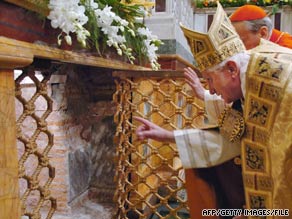Please forgive the terrible pun above, but here is an interesting story out of Rome; just as we are coming to the close of the end of the Pauline Year (and the 2,000th anniversary of St. Paul's birth), Pope Benedict XVI has announced that scientific evidence shows the bones housed in the Basilica of St. Paul in Rome are actually those of St. Paul.
One might be excused for being sceptical about such claims; wags have it that if every piece of the True Cross were assembled, it would be the length of Italy. Similarly, when I asked the Jesuit archivist for New York to provide me some relics the New York Province owned to show the students in my classes at Fordham, I received such unexpected treasures as a piece of Mary's wedding veil, a chunk of the table on which Jesus celebrated the Last Supper, and Elizabeth Ann Seton's Ipod. (For our humorless readers, that last one's a joke. Why am I apologizing? We both know you'll be humorless about it anyway).
But this story about St. Paul has some weight to it, in part because carbon-dating of bone fragments indicates that the person buried inside was from the first or second century, and within the tomb itself (which is inscribed PAULO APOSTOLO MART, "The Apostle Paul, a martyr") are "traces of a precious linen cloth, purple in color and laminated with pure gold, and a blue colored textile with linen filaments," suggesting those who buried the body considered the individual someone of great importance.
Jim Keane, S.J.








Oligopistos! Or rather (if my own Greek is correct, which is probably isn't), you of little faith. Or rather just enough faith. Actually all those "traditional places" usually turn out to be fairly well founded in the lives of the saints. For instance, I once heard a scholar for example remind listeners that some of the shrines associated with Jesus's life have a pretty good chance of being authentic since much of Jesus's family would have most likely remained near Nazareth and would have said, when asked where this or that happened, "Over there." And if we can go that far back then someone like Paul is not such a stretch.
So I'm all for belief in the (ahem) Pauline corpus.